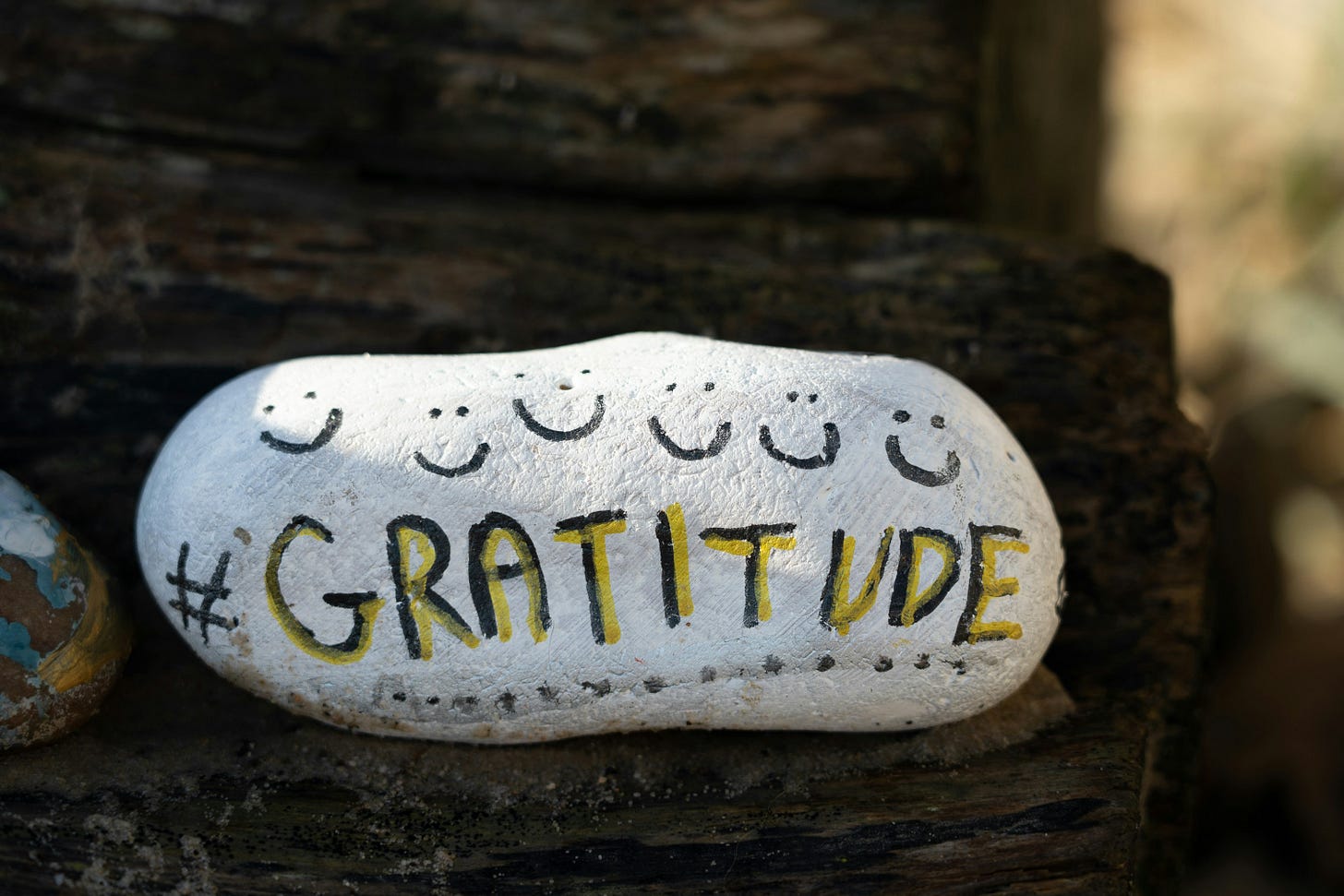“Margaret” is feeling hopeless. She doesn’t know if everything is going to be ok. She hasn’t worked for almost two years, and job prospects in her industry are bleak. She knows she’s not ready to pivot, but she’s also having trouble hanging on. What can she do?
There’s one small action step that Margaret can take every day that will give her energy, motivation, and clarity. It’s so simple most people refuse to believe it works — so they don’t even try. But I’ve done it, and it’s given me amazing results.
It’s called gratitude.

Gratitude is the conscious reflection of what is good in your life.
My Struggle with Gratitude
When I was in some of the darkest days of my career, someone told me to slow down and name what I was appreciative for. I essentially told her to f*** off.
It felt impossible for me to feel like anything in my life was worth being thankful for. After all, I was trying to rebound from being fired. I had no income coming in, I lost my sense of community, and had no idea who I was anymore. What I really wanted was reassurance that everything would turn out fine and I would be back on my career horse in no time at all
I did have friends who offered reassurances, but the truth is they were empty promises. No one knows the future. Cue cliche: All we have is the present.
The Benefits of Gratitude
While it’s important to think strategically while job hunting and contemplating a career pivot, it’s even more important to practice gratitude, which requires noticing what is available to you in the present.
Studies have shown that a gratitude practice will:
Increase self-esteem
Reduce stress and depression
Strengthen relationships
Enhance resilience
Increase productivity
Improve the quality of sleep
Think of it this way. You can have a great car, let’s say a Mercedes. You know you can go comfortably and far in this vehicle. However, if you neglect to put gas in the tank, oil in the engine or air in the tires, the car is not going to perform well or go the distance.

Your metaphorical gas, oil and air is not your strategy on a side hustle, building your network, refinancing your home, or taking a Tony Robbins workshop.
The gas, oil and air is gratitude: appreciating all that makes your life uniquely yours.
What Blocks Gratitude
What gets in the way of gratitude is our natural tendency to focus on the negative – it’s called negativity bias. It’s a survival tool that helped our ancient ancestors stay safe from predators.
So developing gratitude takes effort because you’re working against the brain’s natural tendency to look out for negative events or possibilities.
What Does a Gratitude Practice Look Like?
One of the ways to strengthen the gratitude muscle is to develop a practice of gratitude. This could include talking to a friend, sharing with your family, making a list, drawing pictures, taking photos, posting on social media, volunteering, creating and filling a gratitude box, and whispering out loud the things you see and appreciate.
I highly recommend journaling as your gratitude practice for a one-two punch.
Here are some of the many benefits of journaling about gratitude:
Increases our sense of happiness and joy.
Increases our sense of meaningfulness and engagement with life.
Increases our sense of trust.
Increases our sense of love and compassion for our intimate partners.
Decreases a subjective feeling of pain.
Improves our respiration rate and systolic blood pressure.
Improves conflict resolution skills.
More likely to engage in problem solving.
For full disclosure, I went kicking and screaming into a gratitude practice. I channeled my inner petulant prepubescent self and spent the first few days of journaling with my eyes rolling, heavy sighs and a slouchy body.
When I started to notice a feeling of lightness after writing down what I appreciated, I was resistant. I didn’t want to believe it was that easy. It was almost like I was determined to make my life challenging or difficult.
Within a week, I found my groove. It didn’t make the fact that I was fired go away, but it helped me to feel less hopeless, helpless and powerless. I felt more energy and motivation to handle the job search, and when I was ghosted or didn’t get a gig, I was able to bounce back much quicker.
Margaret used her gratitude practice to stop her fear from running rampant. From there, she was able to gain clarity about what was important to her by reflecting on the things that she was thankful for. Margaret ultimately made a decision to pivot out of her current industry and go to school to study interior design. While she appreciated the job she had, she realized it wasn’t the be all, end all for her. She had so many interests and was excited to learn.
Perhaps my most important discovery, and it was for Margaret too, is that gratitude helped me create and maintain an optimistic view of the future.
Bottom Line
Gratitude is a true game changer. It's hard to believe that something so simple can have a profound impact, especially when it feels like the weight of the world is on your shoulders. But science and personal experiences show that gratitude can provide a powerful shift in perspective.
This doesn't mean the path forward will be easy or that all your problems will disappear. However, it can equip you with a mindset that makes facing challenges more bearable.
Remember, a gratitude practice doesn’t require you to have all the answers or see the entire path ahead. Instead, it invites you to find strength and solace in the present moment, one day at a time. And sometimes, that’s exactly what we need to keep going.
Journal Prompts
Here are five journal prompts to help you develop a gratitude practice:
1. Reflect on a Time of Resilience: Think back to a challenging period in your life. What small actions or practices helped you get through it? How might incorporating gratitude into your routine have changed your experience?
2. Explore Your Gratitude Blocks: What thoughts or beliefs make it difficult for you to feel grateful? How does your focus on these negatives affect your overall well-being and outlook on life?
3. Identify Everyday Blessings: Take a moment to list three things you are grateful for today. They can be as simple as a warm cup of coffee or a supportive friend. How do these things add value to your life?
4. Visualize a Gratitude Practice: Imagine incorporating gratitude into your daily routine. What would that look like for you? How could this practice help you feel more motivated and hopeful about your future?
5. Consider Your Future Self: Picture yourself a year from now after consistently practicing gratitude. How might your perspective on your current situation change? What differences do you notice in your emotional and mental state?
What’s Coming Next Week
We are naturally inclined to look for the negative. Negativity bias is a survival tool, but it doesn’t really help us to thrive. What does help us thrive is learning to love the truth. Check out next week’s blog to learn how to love the truth.
Sources
🙌🏾 Questions? Would you like additional support in accessing resilience? I offer private coaching sessions as well as in-person and virtual group work. Reach out directly here to set up a complimentary consultation.
If you’re resonating with what you’re reading, please consider becoming a paid subscriber. What’s that mean?
You’ll receive weekly blogs with tools and resources to help you reconnect with your resilience after experiencing a professional loss or failure so you come back even stronger in your career.
These newsletters are available to read, listen or watch — I’m a big believer in accessibility for all. You can also listen on Apple Podcasts or Spotify. You can also watch on YouTube.
Be in conversation with me and a beautiful, supportive community through comments, threads and chats.
Access to the full archive of posts.
Early bird 20% premium discount for in-person workshops and retreats.















Share this post